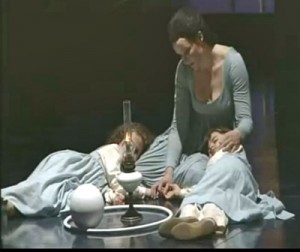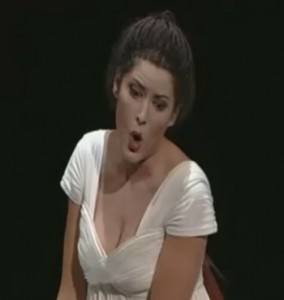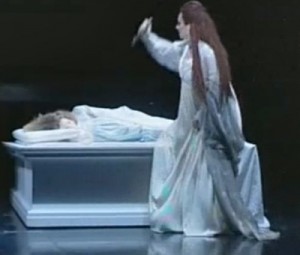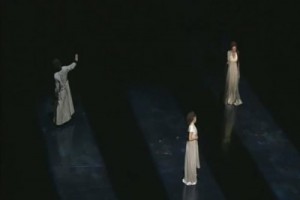Vincenzo Bellini is generally considered to be the master of Bel Canto , and Norma , written in 1831, is generally considered to be his masterpiece.

According to my records, ten years ago I saw productions of Norma by Pocket Opera in San Francisco, and by the Des Moines Metropolitan Opera at Simpson College in Indianola, Iowa but I remember absolutely nothing of either of those productions. Therefore, my review is based entirely on the 2008 HD performance from Bologna which I first saw in January 2009 and have just seen twice more in August 2010. All three times have been at the Camera Seven Theater in Campbell, California.
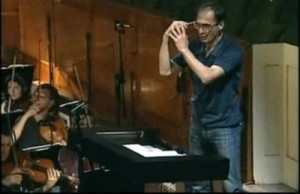
The scene is set in ancient Gaul during the time of Roman conquest. Norma (Daniela Dess�) is the High Priestess of a community of Druids. She is a complete autocrat except that she must obey the strict Druid rules, one of which requires that all Priestesses be virgins and maintain their chastity.
When the opera opens, she has been High Priestess for ten or so years and apparently no one except her personal slave Clotilde (Marie Luce Erard) knows that she has two sons, ages 4 and 6. Further, the father is Pollione, (Fabio Armiliato) pro-consul of the hated Romans, deadly enemies of the Druids. Norma is still head-over-heels in love with Pollione, but he, the cad, now considers her too ancient and decrepit and has transferred his affection to the much younger Priestess Adalgisa (Kate Aldrich) who falls for him hook, line, and sinker.
The old Priest, Oroveso (Rafal Siwek), opens with a fine bass aria in which he reviews the situation – of course not including Norma’s motherhood of which he is totally, if improbably, ignorant. He sings about the nearby camp of the hated Romans. Someday we will rise up and exterminate them, but the time is not yet. The Gods don’t think this is a good time for war, and Norma has promised to tell them the minute the Gods change their minds and give an OK.
The Druids file off and we hear Pollione telling his centurion aide (Flavio Antonello Ceron) about how Adalgisa has supplanted Norma in his affections.
(Slight digression while I explain that the entire opera is staged somewhat like a Shakespearean play. There is virtually no scenery and an absolute minimum of props, some of which are curiously anachronistic. Characters enter and exit seamlessly without its being called a change of scene)
The Romans leave and the Druids come back with Norma who sings Casta Diva, her famous hymn to the moon. After lengthy applause, exeunt severally.
Adalgisa enters and arias about her conflict between love and duty and her determination to go with duty. Pollione appears. They duet for a while (Bellini does write beautiful duets), he changes her mind, she agrees to run away from the Druids and go to Rome with him. Curtain.
In the beginning of Scene 2 we find out about Norma’s family status and meet her two sons – cute little tykes, but unnaturally silent – almost like zombies. Norma fondles them a bit then calls upon Clotilde to take them away, leaving Norma alone on stage.
Norma has noticed Pollione’s growing coldness, assumes correctly that he’s probably found a younger woman, but has no idea who her rival is. As if on cue, Adalgisa enters and tells Norma that she is hopelessly in love and wants to renounce her Druid vows. Norma, remembering her own “youth” (seven or so years ago!), says:
N: Go to it! You have my blessing. By the way, who is the young man?
A: He’s a Roman.
N: (Dramatic gasp of impending doom)
A: (As Pollione appears on cue) In fact, here he is
N: !$%&*^#
In an instant Norma goes from the benevolent elder woman helping smooth the path of true love for her young friend to the beleaguered older woman fighting viciously against the would-be young usurper. Pollione decides to join the fun and the three of them make some beautiful music together, each one telling the audience her or his side of the story and no one paying much attention to what the others are saying (Bellini also writes beautiful trios). Both women are telling Pollione what they think of his caddish ways and he is saying, “OK, so I was a bad boy in the past but this is true love and I can’t help myself so why are you two being so unreasonable.” They’d probably be singing yet, except the Druid gong sounds signifying “Coffee break is over, Norma; you’re our High Priestess, so get back to work.”
Act II begins with Norma deciding she can’t go on living without Pollione (I know, you or I would feel she’s well rid of him, but we’re not Grand Opera heroines). She comes up with two possible solutions:
Plan A: Sweet and bitter revenge. Kill the two children a la Medea, then kill herself. That way Pollione and Adalgisa can live-unhappily-ever-after in miserable remorse.
Plan B: Noble and forgiving. Make Adalgisa promise to take her two children, marry their father, run off to Rome, and live-happily-ever-after; “if you do that I can happily end my own unhappy life.” “No way,” says Adalgisa. “I certainly don’t want Pollione now that I know what he did to you. Here’s my plan.”
Plan C: Adalgisa is confident that she can make Pollione see that he should forget her and go back to Norma. He’ll fall in love with Norma all over again and everybody will live-happily-ever-after.
Norma is finally persuaded to go with Plan C; the two women are best friends again and sing a happy duet to that effect as the curtain closes the scene.
The final scene begins on that same happy note. For the only time in the entire opera we see Norma smile. . . . .And on that happy note, I’ll end my review. There’s still a whole, highly dramatic scene to come with lots of beautiful music including a stirring bit of martial music. But I have to leave you something unknown to look forward to when Norma is next performed by an opera company in your vicinity.
But before I sign off, kudos to Director Federico Tiezzi and Lights person Vilmo Furian for the staging of the Act I Finale. The entire stage is in almost complete darkness except for 3 pools of light, one for each singer.
They move about the stage in different patterns as the singers emphasize different aspects of their relationships. The singers are sometimes facing each other, sometimes the audience, and sometimes with backs turned. Very dramatic.
And kudos also to whomever did the makeup for the two women. In real life, Daniela Dess� is only about 15 years older than Kate Aldrich, but on the stage Norma looks ancient and Adalgisa looks scarcely out of her teens. And Pollione looks like the scumbag he is.
The singing throughout is excellent and the acting of all three major characters is superb. The music is eminently listenable and, as I’ve said, the staging and lighting are fantastic. I’ve now seen this production three times and I hope that one of the other opera companies will put it on in the near future; I’d love to see what some other director would make of it.
The Opera Nut
Photos: Photos were copied from various public domain sources on the web. Many of them were stop-action frames from youTube.
This review by Philip G Hodge appeared in sanfranciscosplash.com on August 25, 2010

